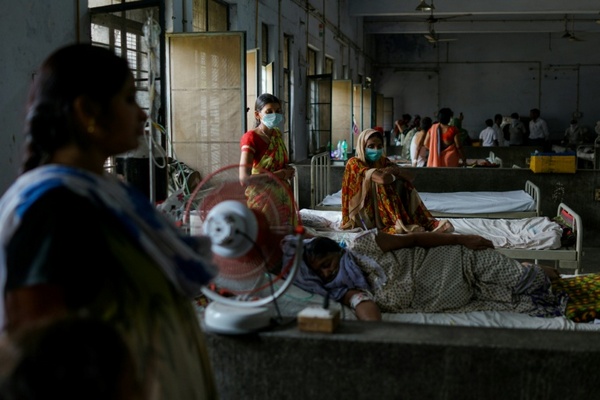
Doctors at the Murari Lal Chest Hospital blame atmospheric pollution for the rise in chronic lung disease cases. /AFP
Soot turned the white handkerchief around Abhash Kumar Sharma’s face to black as the police officer tried to direct gridlocked traffic in the Indian city with the world’s dirtiest air.
It was all he had to ward off the pollution blamed for filling Kanpur’s hospital beds with growing numbers of chronic lung and cancer cases.
“It is the same story for everyone who spends such long hours out in this city,” said Sharma, who does not get a mask for his duties.
“The pollution gets into your eyes and it often stings.”
The city of three million people has been smarting since a World Health Organization (WHO) report last month put it at the head of 14 Indian cities in the world’s top 15 with the dirtiest air.
The pain has been building up for much longer, but as the world marks Environment Day, the fallout has reached crisis point for many in Kanpur.
Sunil Dahiya, senior campaigner with Greenpeace India, said “the models available to us make it certain that hundreds of thousands of people are dying in India each year because of air pollution.”
A senior doctor at the Murari Lal Chest Hospital, Anand Kumar, said the number of patients has jumped from about 40,000 in 2015 to 64,000 last year.
“More than 50 percent of these patients, maybe more, come with breathing-related issues,” the doctor told AFP.
“Even the severity is worsening. Many who earlier recovered in a day or two now need days and much stronger medication to get better.”
The number of chronic pulmonary disease and lung cancer cases is rising among non-smokers, particularly women, he added. “There is no reason for it (other) than primarily atmospheric pollution.”
Children under five are also suffering more, he added.
In one overcrowded ward, 74-year-old Ram Lakhan, who spends long periods in hospital barely able to breathe, blamed his suffering on cars.
“Where are the trees now? We only have vehicles, pollution and traffic jams. With all the greenery gone, we are only breathing what is available – pollution,” he said.
“I’ve never had it this bad before. I only used to feel breathlessness and discomfort in bad winters, when there was smog. But it has been hard even in summers for the last two or three years,” he added.